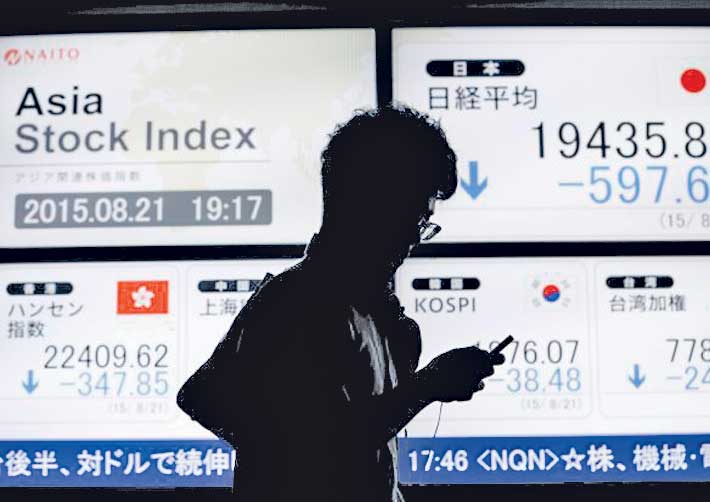Saturday Feb 21, 2026
Saturday Feb 21, 2026
Wednesday, 26 August 2015 00:00 - - {{hitsCtrl.values.hits}}

Volatile global markets got some respite from their latest sharp sell-off on Tuesday as bargain hunters boosted European and most Asian stocks, though China was pummelled again.
As investors dipped their toes back into still choppy waters, the dollar and beaten-down oil prices rose for the first time in five days, safe-haven bonds edged down and defensive positions in the yen and euro were cut.
With market hopes of stimulus measures from authorities in Beijing still unfulfilled, China’s main equity markets slumped a further 8% overnight while Japan’s Nikkei lost 4%. But the rest of Asia was calmer, gaining 2.1% after an initial dip to three-year lows.
Europe fought its way back too, supported by takeover news after Monday’s global beating wiped around 450 billion euros ($520 billion) off the value of its leading stocks.
The pan-European FTSEurofirst 300 index rose 2.7%, recouping around half of the 5%-plus it lost the previous day as London, Paris and Frankfurt bounced 2.4-2.9%.
Hans Peterson, global head of asset allocation at SEB investment management said that, under current circumstances, Europe’s steady if unspectacular economic backdrop made its share markets relatively attractive.
Swiss agricultural chemicals maker Syngenta bounced 9.0% after a source said Monsanto had sweetened a takeover bid, and British insurer RSA gained 4.7% after an offer from Zurich Insurance.
Valentijn van Nieuwenhuijzen, head of multi-asset strategy at NN Investment Partners, agreed Monday’s market moves had gone too far.
The currency market was also calmer. The dollar, pulling out of a four-day slide that had left it at a seven-month low, rose against the yen.
Traders said a rise in U.S. stock index futures helped spur dollar-buying earlier in the day and it rose to 120.11 yen at one point. The dollar slipped as a rebound in Japanese stocks petered out, but it still traded up around 1% at 119.68 yen and rose 0.35% against its currency basket.
The euro eased to $1.1552 having set a seven-month peak of $1.1715 on Monday, with a rise in Germany’s bellwether IFO business climate index in August having little immediate impact.
German Bund yields rose as the previous day’s rush for safety eased, with the 10-year benchmark up 6 basis points at 0.64%. U.S. Treasuries did likewise.
But the overall picture was mixed.Mainland Chinese shares had another calamitous day with the Shanghai Composite Index breaking below 3,000, having fallen 15% over the previous three days.
The continued weakness in China kept pressure on crude oil markets which, while recovering slightly from Monday’s 6% drop, held not far from 6-1/2-year lows.
Oil bounced back from heavy losses on Tuesday but global oversupply and worries over the severity of the economic slowdown in China, the world’s top commodity consumer, kept prices near 6-1/2-year lows.
European equity markets recovered on Tuesday but Chinese stock markets closed down more than 7%, with panic selling intensifying after the flagship Shanghai Composite Index crashed through key support at 3,000 points.
US crude, also known at West Texas Intermediate or WTI, was up $1.10 at $39.34 a barrel by 0930 GMT, while Brent was up $1.20 at $43.89.
Oil prices dropped to their lowest since early 2009 on Monday and many analysts think market fundamentals will keep prices low, despite Tuesday’s slight uplift.